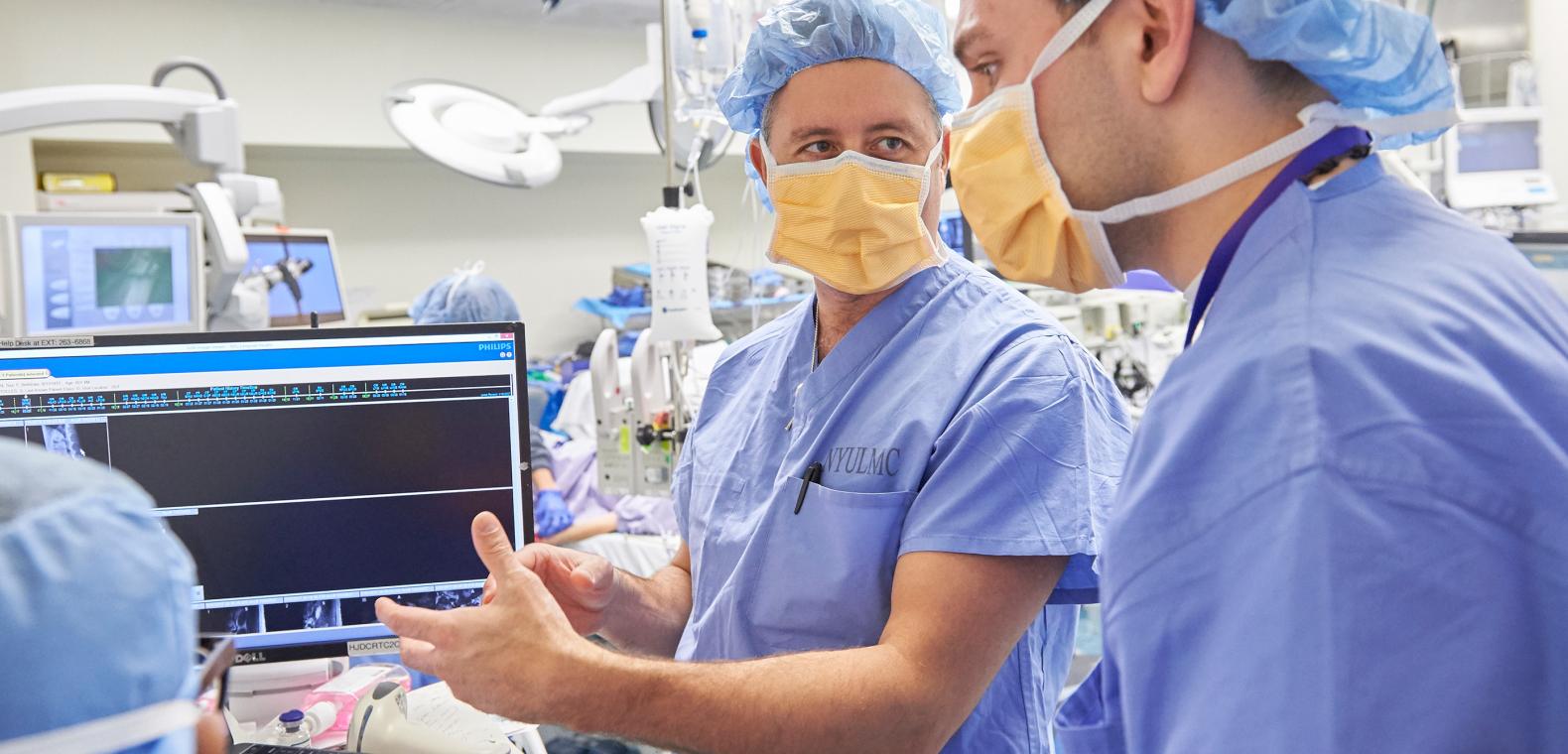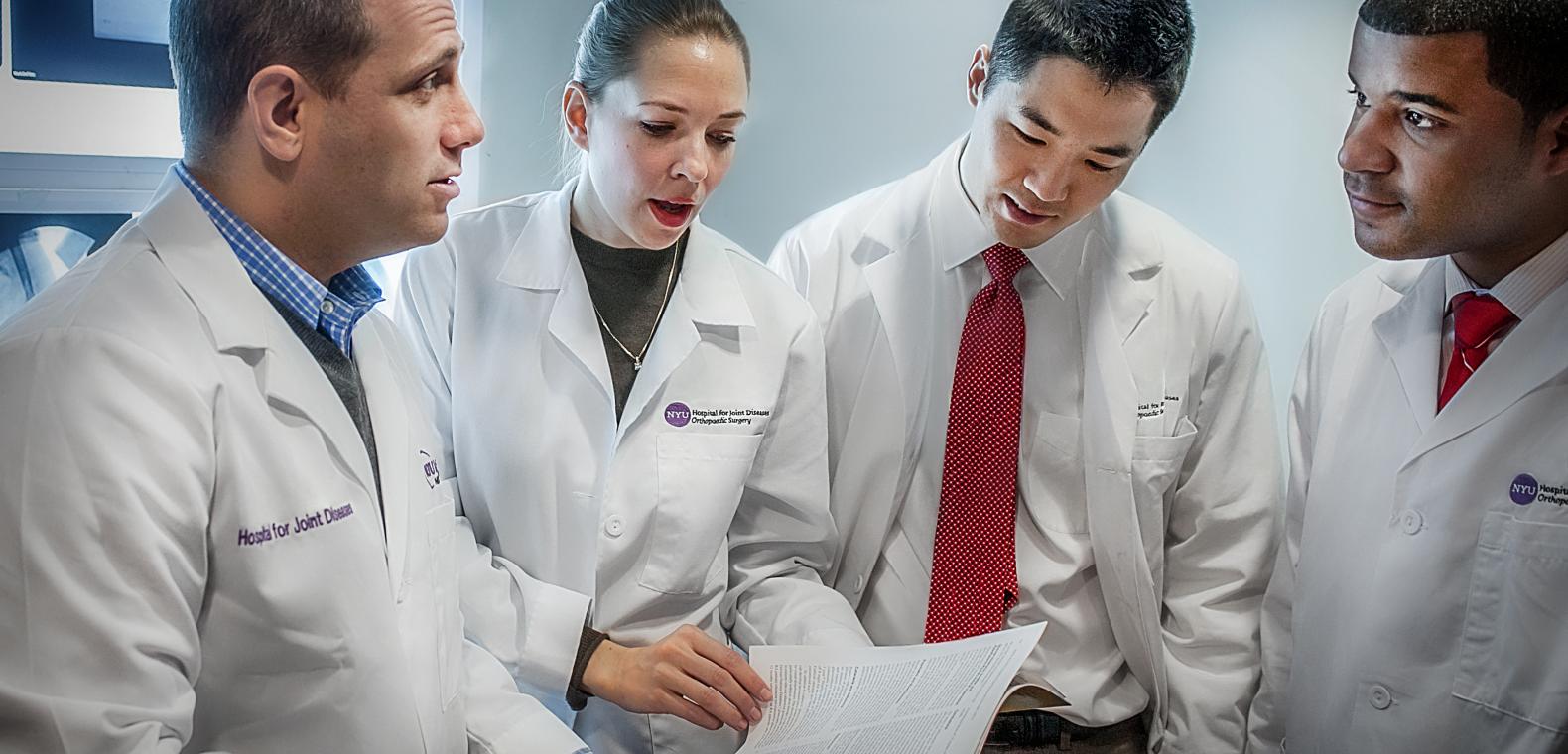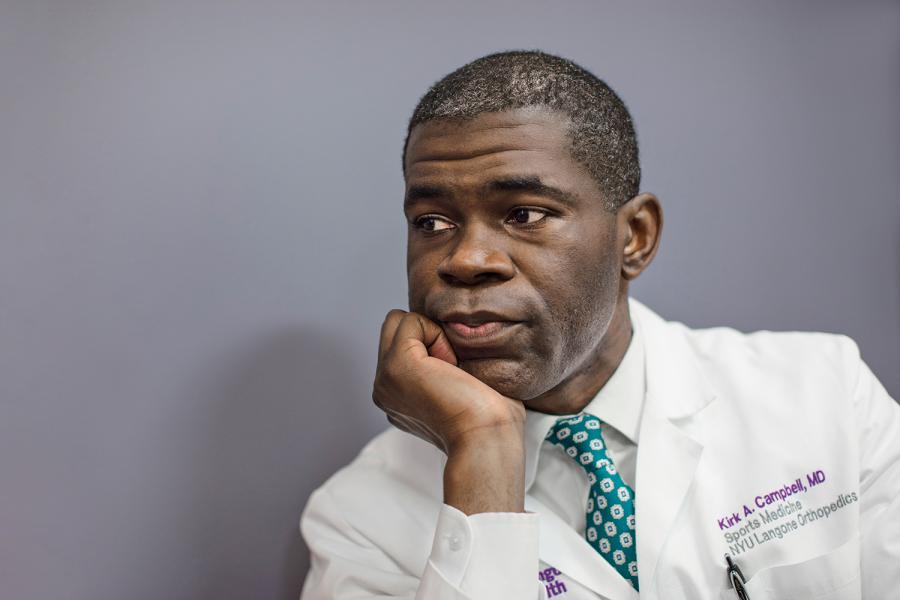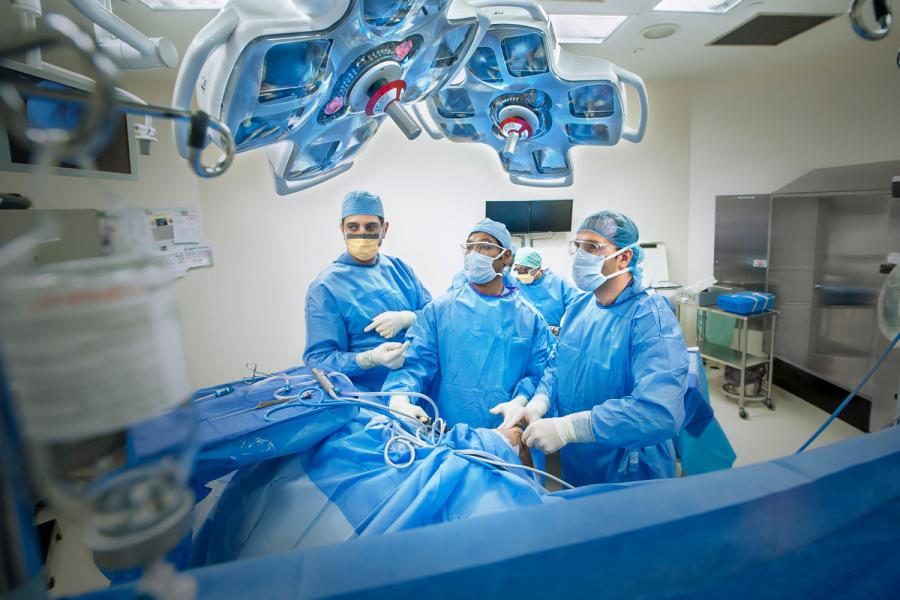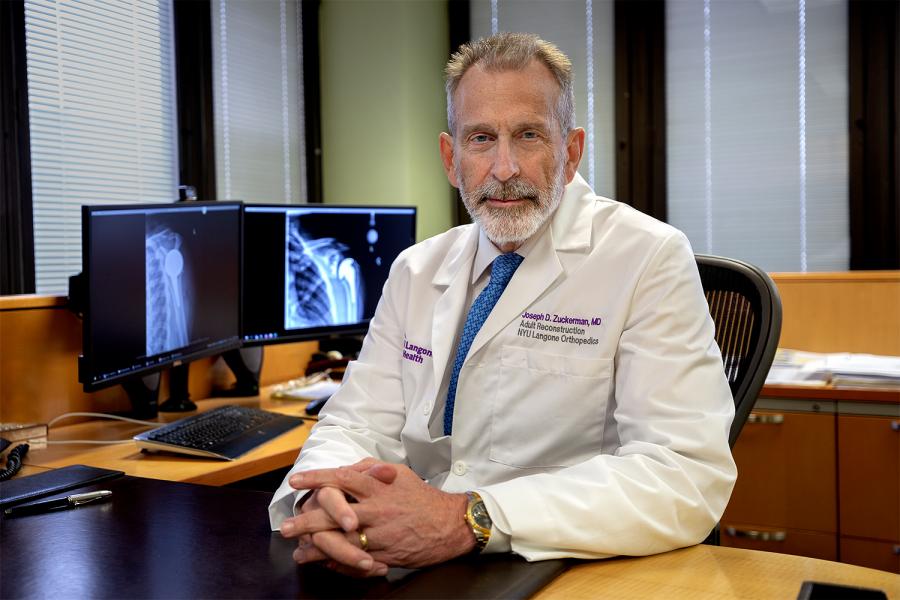
Orthopedic Surgery Residency
Every year in the Department of Orthopedic Surgery, we select 16 new residents from a pool of more than 600 applicants for our fully accredited, five-year residency training program. Our goal is for residents to gain the necessary knowledge and experience to successfully complete the certifying exams of the American Board of Orthopaedic Surgery and to enter the practice as well-trained, highly competent orthopedic surgeons.
Recognized as one of the finest educational experiences available in the United States, our residency program at NYU Grossman School of Medicine is accredited by the Accreditation Council for Graduate Medical Education (ACGME). There are 80 residents in the program at any given time. Two residents are selected into our clinician–scientist training program and spend an extra year performing full-time research between their second and third years of training.
Residents spend 60 months on clinical rotations, which include all major subspecialty areas of orthopedic surgery. Residents in our program gain experience in both outpatient and inpatient settings and are trained in operative and nonoperative treatments for a wide variety of orthopedic conditions and pathologies. Members of our large teaching faculty provide close interaction and supervision. Faculty also offer one or two weekly case conferences for each clinical rotation.
Clinical training is enhanced by a comprehensive didactic program that includes conferences in all areas of clinical orthopedics, fractures, basic science, and orthopedic pathology. Based on a two-year cycle, the didactic program provides each resident with at least two complete curriculum cycles during the five years of orthopedic training.
Our research scientists and clinical faculty work together to provide a thorough basic science didactic curriculum based on the one recommended by the American Academy of Orthopaedic Surgeons (AAOS).
All residents are required to complete a minimum of three writing projects to demonstrate scholarly activity during their five-year residency. One must be an original basic science or clinical research project. Book chapters, review articles, and other scholarly activities, such as video projects, may fulfill the other two requirements. The majority of our residents complete many more than the minimum requirement.
As a resident in our program, you rotate in all of the key subspecialties of orthopedic surgery:
- adult reconstructive surgery
- foot and ankle surgery
- hand surgery
- orthopedic oncology
- pediatric orthopedic surgery
- shoulder and elbow surgery
- spine surgery
- sports medicine
- trauma and fracture surgery
An important component of resident education is our Surgical Skills Lab, which can be used for open and arthroscopic procedures, as well as our virtual reality simulators.
Orthopedic Surgery Residency Training Experience
Training in our program is based on the principle of graduated responsibility as knowledge and experience are gained throughout each rotation. Clinical rotations take place in several locations, including NYU Langone’s Tisch Hospital, Kimmel Pavilion, NYU Langone Orthopedic Hospital, NYU Langone Orthopedic Center, NYU Langone Hospital—Brooklyn, and Hassenfeld Children’s Hospital at NYU Langone, as well as the VA NY Harbor Healthcare System, NYC Health + Hospitals/Bellevue, and Jamaica Hospital Medical Center.
Year One
The first residency year is a combined medical and surgical experience. Rotations include a surgical skills “boot camp,” general surgery, trauma surgery, plastic surgery, adult reconstructive surgery, orthopedic trauma surgery, general orthopedics, and pediatric orthopedic surgery. Additionally, rotations in the intensive care unit and the emergency room are included in the year-one schedule.
Year Two
Second-year rotations offer experience in managing different orthopedic conditions in both outpatient and inpatient settings. Second-year residents provide orthopedic consultations in our emergency rooms. The operating room experience emphasizes acquiring basic psychomotor technical skills and learning the fundamental principles of anatomy, surgical dissection, and orthopedic surgery. Developing a basic foundation of orthopedic knowledge is paramount during this year of training.
Year Three
At this point in the program, you should have the knowledge and experience to more actively direct the care of orthopedic patients. In the third year, the focus is on completing orthopedic subspecialty rotations, which helps determine which subspecialty fellowship to pursue. Experience in both inpatient and outpatient care, as well as in the operating room, increases at this level. You actively participate in a larger volume of increasingly complex cases, providing preparation for the senior resident years.
Year Four
Responsibility for patient care continues to increase, and in some rotations, the fourth-year resident reports directly to the fellows and attending staff. Although the fifth-year resident on each service is the chief resident, the fourth-year resident has specific clinical responsibilities, including times where they are functioning as the supervising resident. This year of training is a pivotal shift from junior to senior resident, and expectations and responsibilities grow accordingly. You become more actively involved in the development of treatment plans for both outpatients and inpatients, while moving into the roles of primary surgeon and first assistant in the operating room. Fourth-year residents are expected to make the transition to a more senior role on the clinical care team.
Year Five
During your final year of training, you function as the chief of a multiple-resident service, which can vary from two to six residents depending on the rotation. The chief resident is responsible for all clinical activities of the service, including inpatient and outpatient care, as well as all operating room activity. The coordination of all resident and fellow activity and the oversight of the care provided is the responsibility of the chief resident. You work directly with the chief of service and other members of the teaching faculty. Your role as primary surgeon and first assistant in the operating room continues to progress throughout this year of training.
Commitment to Inclusivity
NYU Langone’s Department of Orthopedic Surgery is committed to supporting the goals of the AAOS in fostering inclusion in orthopedics, including understanding and responding to the patient population, enhancing the delivery of culturally competent care, and supporting efforts to advance the profession and orthopedic workforce.
As part of our effort to meet these goals, the department’s educational program is committed to identifying and training qualified professionals who are interested in orthopedic surgery.
Disclaimer: NYU Langone’s programs do not include preferences, quotas, or set asides, or otherwise exclude anyone based on race, sex, or other protected categories.
Contact Us
For more information about our residency program, contact Randie Godette, MS, senior residency program coordinator, at 212-598-6509 or randie.godette@nyulangone.org.
